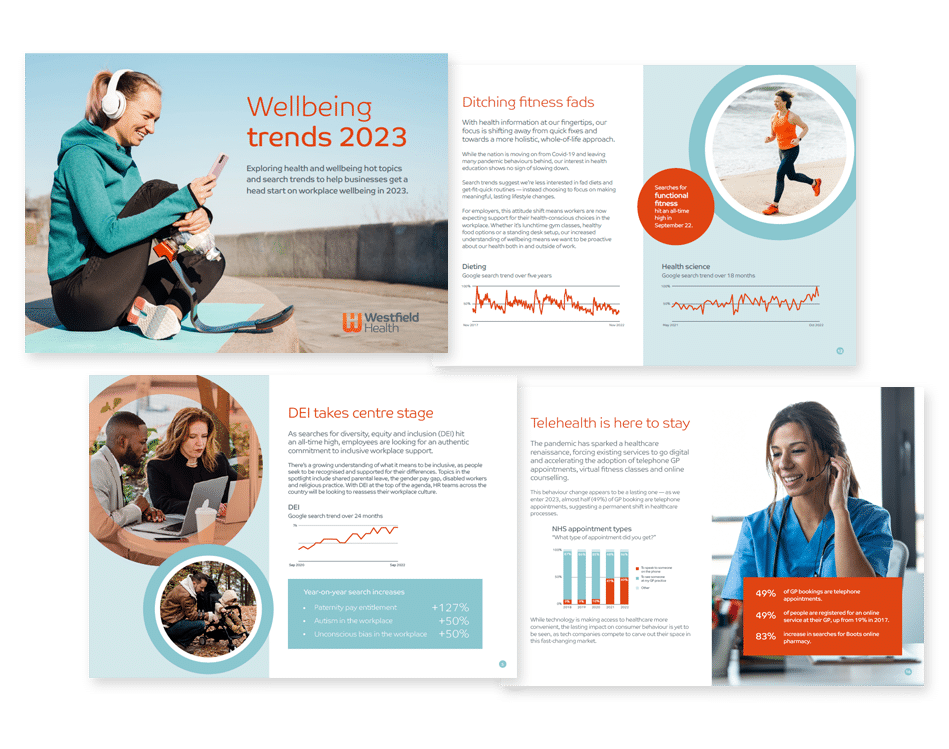The UK ends 2022 as a nation gripped by uncertainty. After another year defined by instability and constant change, we’re witnessing a level of anxiety around health and wellbeing not experienced for decades.
But it’s also a period of rapid development with opportunities to harness this change and increase support in the communities in which we live and work.
Our yearly Wellbeing Trends report explores emerging workplace health and wellbeing topics to give you a head start on employee wellbeing in 2023.
It uses data from sources including the Office for National Statistics, the NHS, Google search trends and our own wellbeing research to help you plan and prioritise your wellbeing support.

Trend 1: Inclusive wellbeing and DEI
As searches for diversity, equity and inclusion (DEI) hit an all-time high, employees are looking for an authentic commitment to inclusive workplace support.

There’s a growing understanding of what it means to be inclusive, as people
seek to be recognised and supported for their differences.
Topics in the spotlight include shared parental leave, the gender pay gap, disabled workers and religious practice. With DEI at the top of the agenda, HR teams across the country will be looking to reassess their workplace culture.
Trend 2: Financial wellbeing support
The cost-of-living crisis is now a key area of concern for the UK public having a significant impact on both mental and physical health. Last year’s wellbeing trends report included ONS data showing a cost-of-living increase for 62% of UK adults — this year that figure has risen to 93%.
Research from the BACP found that two thirds (66%) of therapists say cost of living concerns are causing a decline in people’s mental health, and 61% of therapists say their clients are anxious about whether they can afford to pay their household bills.

In the workplace, people are increasingly looking for financial support from their employer, but limited budget for salary reviews is driving talented workers to look for better pay elsewhere.
Trend 3: Preventative healthcare
With health information at our fingertips, our focus is shifting away from quick fixes and towards a more holistic, whole-of-life approach.
While the nation is moving on from Covid-19 and leaving many pandemic behaviours behind, our interest in health education shows no sign of slowing down.

With the aftermath of the pandemic also comes an increased worry about how we can support our future health. Google searches for ‘NHS waiting times’ continue to rise, fuelling anxiety around access to healthcare in the UK.
This lack of trust is now driving people to put their own preventative measures in place, whether that’s being more proactive about their lifestyle choices or taking out private health insurance to cover future treatment.
Trend 4: Telehealth and the virtual office
The pandemic has sparked a healthcare renaissance, forcing existing services to go digital and accelerating the adoption of telephone GP appointments, virtual fitness classes and online counselling.

This behaviour change appears to be a lasting one — as we enter 2023, almost half (49%) of GP booking are telephone appointments, suggesting a permanent shift in healthcare processes.
The digital world also continues to blend with our work lives. Despite calls for a return to the office, our recent research found that flexible working remains the most coveted employee benefit, suggesting that remote opportunities are as appealing as ever.

Despite this, we’re increasingly aware of the need to disconnect, with designated quiet hours, ‘no meeting’ days and the four-day working week becoming more common. As we enter 2023, employers must monitor the impact of stress on their people with an awareness that online-only solutions might alienate those who are desperate to switch off.
Download the full report for free
Our 2023 Wellbeing Trends report features an in-depth look at emerging hot topics in health and wellbeing.
It uses data from Google search trends, the Office for National Statistics, the NHS and our wellbeing research to help business leaders, managers and HR teams get a head start on supporting their people throughout 2023.
